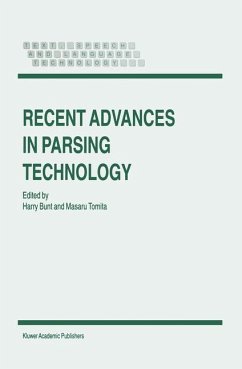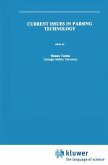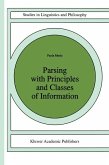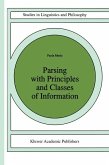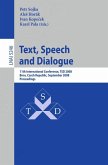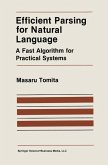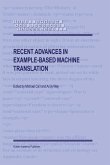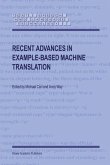H. Bunt / M. Tomita (Hgg.)
Recent Advances in Parsing Technology
Herausgegeben von Bunt, H.; Tomita, Masaru
H. Bunt / M. Tomita (Hgg.)
Recent Advances in Parsing Technology
Herausgegeben von Bunt, H.; Tomita, Masaru
- Broschiertes Buch
- Merkliste
- Auf die Merkliste
- Bewerten Bewerten
- Teilen
- Produkt teilen
- Produkterinnerung
- Produkterinnerung
In Marcus (1980), deterministic parsers were introduced. These are parsers which satisfy the conditions of Marcus's determinism hypothesis, i.e., they are strongly deterministic in the sense that they do not simulate non determinism in any way. In later work (Marcus et al. 1983) these parsers were modified to construct descriptions of trees rather than the trees them selves. The resulting D-theory parsers, by working with these descriptions, are capable of capturing a certain amount of ambiguity in the structures they build. In this context, it is not clear what it means for a parser to meet…mehr
Andere Kunden interessierten sich auch für
![Current Issues in Parsing Technology Current Issues in Parsing Technology]() M. Tomita (Hrsg.)Current Issues in Parsing Technology154,99 €
M. Tomita (Hrsg.)Current Issues in Parsing Technology154,99 €![Parsing with Principles and Classes of Information Parsing with Principles and Classes of Information]() Paola MerloParsing with Principles and Classes of Information77,99 €
Paola MerloParsing with Principles and Classes of Information77,99 €![Parsing with Principles and Classes of Information Parsing with Principles and Classes of Information]() Paola MerloParsing with Principles and Classes of Information77,99 €
Paola MerloParsing with Principles and Classes of Information77,99 €![Text, Speech and Dialogue Text, Speech and Dialogue]() Text, Speech and Dialogue79,99 €
Text, Speech and Dialogue79,99 €![Efficient Parsing for Natural Language Efficient Parsing for Natural Language]() M. TomitaEfficient Parsing for Natural Language77,99 €
M. TomitaEfficient Parsing for Natural Language77,99 €![Recent Advances in Example-Based Machine Translation Recent Advances in Example-Based Machine Translation]() M. Carl / Andy Way (Hgg.)Recent Advances in Example-Based Machine Translation116,99 €
M. Carl / Andy Way (Hgg.)Recent Advances in Example-Based Machine Translation116,99 €![Recent Advances in Example-Based Machine Translation Recent Advances in Example-Based Machine Translation]() M. Carl / Andy Way (Hgg.)Recent Advances in Example-Based Machine Translation116,99 €
M. Carl / Andy Way (Hgg.)Recent Advances in Example-Based Machine Translation116,99 €-
-
-
In Marcus (1980), deterministic parsers were introduced. These are parsers which satisfy the conditions of Marcus's determinism hypothesis, i.e., they are strongly deterministic in the sense that they do not simulate non determinism in any way. In later work (Marcus et al. 1983) these parsers were modified to construct descriptions of trees rather than the trees them selves. The resulting D-theory parsers, by working with these descriptions, are capable of capturing a certain amount of ambiguity in the structures they build. In this context, it is not clear what it means for a parser to meet the conditions of the determinism hypothesis. The object of this work is to clarify this and other issues pertaining to D-theory parsers and to provide a framework within which these issues can be examined formally. Thus we have a very narrow scope. We make no ar guments about the linguistic issues D-theory parsers are meant to address, their relation to other parsing formalisms or the notionof determinism in general. Rather we focus on issues internal to D-theory parsers themselves.
Produktdetails
- Produktdetails
- Text, Speech and Language Technology .1
- Verlag: Springer / Springer Netherlands
- Artikelnr. des Verlages: 978-1-4020-0371-4
- Softcover reprint of the original 1st ed. 1996
- Seitenzahl: 432
- Erscheinungstermin: 30. November 2001
- Englisch
- Abmessung: 235mm x 155mm x 24mm
- Gewicht: 603g
- ISBN-13: 9781402003714
- ISBN-10: 1402003714
- Artikelnr.: 21517051
- Text, Speech and Language Technology .1
- Verlag: Springer / Springer Netherlands
- Artikelnr. des Verlages: 978-1-4020-0371-4
- Softcover reprint of the original 1st ed. 1996
- Seitenzahl: 432
- Erscheinungstermin: 30. November 2001
- Englisch
- Abmessung: 235mm x 155mm x 24mm
- Gewicht: 603g
- ISBN-13: 9781402003714
- ISBN-10: 1402003714
- Artikelnr.: 21517051
1 Parsing Technologies, and Why We Need Them.- 1.1 Parsing Technologies.- 1.2 About this book.- 2 Fully Incremental Parsing.- 2.1 Introduction.- 2.2 The Change-Update Loop.- 2.3 Reparsing.- 2.4 The Affected and Regenerated Sets.- 2.5 The Disturbance Set.- 2.6 Primitive Changes.- 2.7 Formal Properties.- 2.8 Implementation.- 2.9 Conclusions.- 3 Increasing the Applicability of LR Parsing.- 3.1 Introduction.- 3.2 Hidden left recursion and LR parsing.- 3.3 Correctness of ?-LR parsing.- 3.4 Calculation of items.- 3.5 Memory requirements.- 3.6 Conclusions.- 4 Towards a Formal Understanding of the Determinism Hypothesis in D-Theory.- 4.1 Introduction.- 4.2 D-Theory and the Determinism Hypothesis.- 4.3 Formalization.- 4.4 Consequences for the D-Theory Parsers.- 4.5 Conclusion.- 5 Varieties of Heuristics in Sentence Parsing.- 5.1 Kinds of grammar and their characteristics.- 5.2 Varieties of heuristic components in parsing sentences.- 5.3 Staged design for parsing sentences.- 5.4 Conclusion.- 6 Parsing as Dynamic Interpretation of Feature Structures.- 6.1 Introduction: the status of feature structures.- 6.2 Feature structures as formal-language expressions.- 6.3 Feature structures in the GEL language.- 6.4 Parsing as model-theoretic interpretation.- 6.5 Conclusions and future work.- 7 Proof Theory for HPSG Parsing.- 7.1 Introduction.- 7.2 An Overview of HPSG.- 7.3 Binary-branching HPSG.- 7.4 Deduction for HPSG.- 7.5 Implementation.- 7.6 Lexical entries.- 7.7 Performance.- 7.8 Conclusions.- 8 Efficient Parsing of Compiled Typed Attribute-Value Logic Grammars.- 8.1 Compiling Type Definitions.- 8.2 Compiling Basic Operations.- 8.3 Compiling Descriptions.- 8.4 Compiling Grammars and Programs.- 8.5 Extensional Types.- 8.6 Inequations.- 8.7 Type Constraints.- 8.8 Conclusion.- 9Predictive Head-Corner Chart Parsing.- 9.1 Introduction.- 9.2 Chart parsing.- 9.3 Left-corner chart parsing.- 9.4 Head-Corner chart parsing.- 9.5 Complexity analysis and further optimizations.- 9.6 Extension with feature structures.- 9.7 Related approaches.- 9.8 Conclusions.- 10 GLR* - An Efficient Noise-Skipping Parsing Algorithm for Context-Free Grammars.- 10.1 Introduction.- 10.2 The GLR* Parsing Algorithm.- 10.3 The Beam Search Heuristic.- 10.4 Parsing of Spontaneous Speech Using GLR*.- 10.5 Conclusions and Future Research Directions.- 11 Evaluation of the Tagged Text Parser, A Preliminary Report.- 11.1 Overview.- 11.2 Introduction to Tagged Text Parser.- 11.3 The TTP Time-out Mechanism.- 11.4 Parser Evaluation with Parseval.- 11.5 Evaluation of TTP.- 11.6 Conclusions.- 12 Learning to Parse with Transformations.- 12.1 Introduction.- 12.2 Transformation-based, Error-driven Learning.- 12.3 Learning Phrase Structure.- 12.4 Results.- 12.5 Sample Output.- 12.6 Assigning Nonterminal Labels.- 12.7 Conclusions.- 13 Estimation of Verb Subcategorization Frame Frequencies based on Syntactic and Multidimensional Statistical Analysis.- 13.1 Introduction.- 13.2 Method.- 13.3 Experiment on Wall Street Journal Corpus.- 13.4 Statistical Analysis.- 13.5 Conclusion and Future Direction.- 14 Monte Carlo Parsing.- 14.1 Introduction.- 14.2 The Data-Oriented Parsing Framework.- 14.3 DOP as a Stochastic Tree-Substitution Grammar.- 14.4 Parsing and Disambiguation in DOP.- 14.5 Experiments with DOP.- 14.6 Conclusions.- 15 Stochastic Lexicalized Tree-Insertion Grammar.- 15.1 Motivation.- 15.2 LTIG.- 15.3 Stochastic LTIG.- 15.4 Parsing SLTIG.- 15.5 Training an SLTIG.- 15.6 Conclusion.- 16 The Interplay of Syntactic and Semantic Node Labels in Parsing.- 16.1 State of the Art Demands.- 16.2Partial Parsing.- 16.3 Semantic Grammars.- 16.4 Parsing to Objects.- 16.5 Defining Parsing Rules Schematically.- 16.6 A Parsing Example.- 16.7 Form Rules.- 16.8 Concluding Remarks.- 17 Integration of Morphological and Syntactic Analysis based on GLR Parsing.- 17.1 Introduction.- 17.2 Morphological Analysis of Japanese.- 17.3 Generating An LR Table.- 17.4 Algorithm.- 17.5 A worked example.- 17.6 Conclusion.- 18 Structural Disambiguation in Japanese by Case Structure Evaluation based on Examples in a Case Frame Dictionary.- 18.1 Introduction.- 18.2 Selecting a Proper Case Frame.- 18.3 Structural Disambiguation using Case Structure Score.- 18.4 Experiment.- 18.5 Conclusions.- 19 Flowgraph Parsing.- 19.1 Introduction and Motivation.- 19.2 Notation and Definitions.- 19.3 Chart Parsing of Context-free Flowgraphs.- 19.4 Complexity Analysis.- 19.5 Dealing With Attributes.- 19.6 Dealing With Tie-Point Relationships.- 19.7 Chart Parsing of Structure-Sharing Flowgraphs.- 19.8 Conclusions.- 20 Predictive Parsing for Unordered Relational Languages.- 20.1 Introduction.- 20.2 Atomic Relational Grammars.- 20.3 Parsing Preliminaries.- 20.4 Preliminaries to a Parser.- 20.5 Earley-style Recognition for ARGs.- 20.6 Parse trace.- 20.7 Conclusion.
1 Parsing Technologies, and Why We Need Them.- 1.1 Parsing Technologies.- 1.2 About this book.- 2 Fully Incremental Parsing.- 2.1 Introduction.- 2.2 The Change-Update Loop.- 2.3 Reparsing.- 2.4 The Affected and Regenerated Sets.- 2.5 The Disturbance Set.- 2.6 Primitive Changes.- 2.7 Formal Properties.- 2.8 Implementation.- 2.9 Conclusions.- 3 Increasing the Applicability of LR Parsing.- 3.1 Introduction.- 3.2 Hidden left recursion and LR parsing.- 3.3 Correctness of ?-LR parsing.- 3.4 Calculation of items.- 3.5 Memory requirements.- 3.6 Conclusions.- 4 Towards a Formal Understanding of the Determinism Hypothesis in D-Theory.- 4.1 Introduction.- 4.2 D-Theory and the Determinism Hypothesis.- 4.3 Formalization.- 4.4 Consequences for the D-Theory Parsers.- 4.5 Conclusion.- 5 Varieties of Heuristics in Sentence Parsing.- 5.1 Kinds of grammar and their characteristics.- 5.2 Varieties of heuristic components in parsing sentences.- 5.3 Staged design for parsing sentences.- 5.4 Conclusion.- 6 Parsing as Dynamic Interpretation of Feature Structures.- 6.1 Introduction: the status of feature structures.- 6.2 Feature structures as formal-language expressions.- 6.3 Feature structures in the GEL language.- 6.4 Parsing as model-theoretic interpretation.- 6.5 Conclusions and future work.- 7 Proof Theory for HPSG Parsing.- 7.1 Introduction.- 7.2 An Overview of HPSG.- 7.3 Binary-branching HPSG.- 7.4 Deduction for HPSG.- 7.5 Implementation.- 7.6 Lexical entries.- 7.7 Performance.- 7.8 Conclusions.- 8 Efficient Parsing of Compiled Typed Attribute-Value Logic Grammars.- 8.1 Compiling Type Definitions.- 8.2 Compiling Basic Operations.- 8.3 Compiling Descriptions.- 8.4 Compiling Grammars and Programs.- 8.5 Extensional Types.- 8.6 Inequations.- 8.7 Type Constraints.- 8.8 Conclusion.- 9Predictive Head-Corner Chart Parsing.- 9.1 Introduction.- 9.2 Chart parsing.- 9.3 Left-corner chart parsing.- 9.4 Head-Corner chart parsing.- 9.5 Complexity analysis and further optimizations.- 9.6 Extension with feature structures.- 9.7 Related approaches.- 9.8 Conclusions.- 10 GLR* - An Efficient Noise-Skipping Parsing Algorithm for Context-Free Grammars.- 10.1 Introduction.- 10.2 The GLR* Parsing Algorithm.- 10.3 The Beam Search Heuristic.- 10.4 Parsing of Spontaneous Speech Using GLR*.- 10.5 Conclusions and Future Research Directions.- 11 Evaluation of the Tagged Text Parser, A Preliminary Report.- 11.1 Overview.- 11.2 Introduction to Tagged Text Parser.- 11.3 The TTP Time-out Mechanism.- 11.4 Parser Evaluation with Parseval.- 11.5 Evaluation of TTP.- 11.6 Conclusions.- 12 Learning to Parse with Transformations.- 12.1 Introduction.- 12.2 Transformation-based, Error-driven Learning.- 12.3 Learning Phrase Structure.- 12.4 Results.- 12.5 Sample Output.- 12.6 Assigning Nonterminal Labels.- 12.7 Conclusions.- 13 Estimation of Verb Subcategorization Frame Frequencies based on Syntactic and Multidimensional Statistical Analysis.- 13.1 Introduction.- 13.2 Method.- 13.3 Experiment on Wall Street Journal Corpus.- 13.4 Statistical Analysis.- 13.5 Conclusion and Future Direction.- 14 Monte Carlo Parsing.- 14.1 Introduction.- 14.2 The Data-Oriented Parsing Framework.- 14.3 DOP as a Stochastic Tree-Substitution Grammar.- 14.4 Parsing and Disambiguation in DOP.- 14.5 Experiments with DOP.- 14.6 Conclusions.- 15 Stochastic Lexicalized Tree-Insertion Grammar.- 15.1 Motivation.- 15.2 LTIG.- 15.3 Stochastic LTIG.- 15.4 Parsing SLTIG.- 15.5 Training an SLTIG.- 15.6 Conclusion.- 16 The Interplay of Syntactic and Semantic Node Labels in Parsing.- 16.1 State of the Art Demands.- 16.2Partial Parsing.- 16.3 Semantic Grammars.- 16.4 Parsing to Objects.- 16.5 Defining Parsing Rules Schematically.- 16.6 A Parsing Example.- 16.7 Form Rules.- 16.8 Concluding Remarks.- 17 Integration of Morphological and Syntactic Analysis based on GLR Parsing.- 17.1 Introduction.- 17.2 Morphological Analysis of Japanese.- 17.3 Generating An LR Table.- 17.4 Algorithm.- 17.5 A worked example.- 17.6 Conclusion.- 18 Structural Disambiguation in Japanese by Case Structure Evaluation based on Examples in a Case Frame Dictionary.- 18.1 Introduction.- 18.2 Selecting a Proper Case Frame.- 18.3 Structural Disambiguation using Case Structure Score.- 18.4 Experiment.- 18.5 Conclusions.- 19 Flowgraph Parsing.- 19.1 Introduction and Motivation.- 19.2 Notation and Definitions.- 19.3 Chart Parsing of Context-free Flowgraphs.- 19.4 Complexity Analysis.- 19.5 Dealing With Attributes.- 19.6 Dealing With Tie-Point Relationships.- 19.7 Chart Parsing of Structure-Sharing Flowgraphs.- 19.8 Conclusions.- 20 Predictive Parsing for Unordered Relational Languages.- 20.1 Introduction.- 20.2 Atomic Relational Grammars.- 20.3 Parsing Preliminaries.- 20.4 Preliminaries to a Parser.- 20.5 Earley-style Recognition for ARGs.- 20.6 Parse trace.- 20.7 Conclusion.

